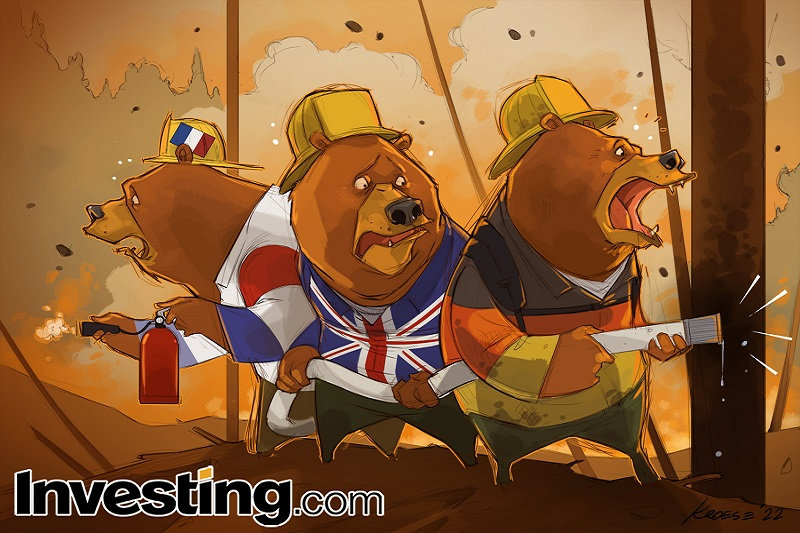By Geoffrey Smith
Investing.com -- This year’s drought in Europe has not just killed off any lingering hope of an economic rebound, it may have set the stage for another year of stagnation and high inflation in 2023.
It’s not just that the lack of rainfall since winter has dried out some of the continent’s most important agricultural growing areas, something that has ensured that the usual summer drop in seasonal food prices has been less pronounced.
Nor just that has it underlined the long-term risks of climate change, making the job of mitigating it more urgent and, consequently, more expensive.
Both of those short- and long-term effects are bad enough in their own right, but they pale in comparison to the havoc that the weather is wreaking with the continent’s energy system. The drought has intensified all the structural problems exposed by Vladimir Putin’s invasion of Ukraine and the consequent drop in energy imports from Russia.
European power prices have shot off the scale in the last three weeks as the lack of water in the continent’s rivers has forced one form of generation after another to reduce output, removing the safety margin that could otherwise have coped with a sharp drop in generation powered by Russian gas.
Two cases in particular make the scale of the problem clear. In Germany, water levels on the Rhine are now so low that barges cannot carry coal or fuel oil upriver to waiting power stations. Carsten Brzeski, an analyst with ING, reckons that the hit to German GDP will be much worse than the 0.3% suffered in 2018, the last time water levels were so low.
“Back then, the low water period only came in late-September. This time around, low water levels have come earlier and there is little rain relief in sight,” Brzeski said in a note to clients. He expects the drought to take at least 0.5% of German GDP in the second half of this year, adding that “it would need an economic miracle to avoid a recession.”
Across the Rhine, the situation is no better. The lack of river water forced authorities earlier this summer to order Electricite de France to cut output at its nuclear plants, so that the water they use for cooling reactors wouldn’t overheat the rivers and kill wildlife as it is discharged. The Agence de Securite Nucleaire has subsequently had to issue waivers to that rule because so many of EDF’s ageing reactors are offline over reliability concerns already.
A glimmer of relief – or common sense – came on Tuesday, when The Wall Street Journal reported that the German government is preparing to extend the operating life of the country’s three remaining nuclear reactors. That breaks a taboo among the Greens, the junior partner in the ruling federal coalition, which has campaigned relentlessly for the end of nuclear power since the 1980s.
For the moment, though, wholesale power prices on both sides of the Rhine are now at multiples of where they were before the war started.
Spikes in spot market prices have already killed off dozens of smaller energy suppliers whose business plan assumed the long-term availability of cheap gas-fired and nuclear generation. But the prices that were dismissed as freakishly high spikes a couple of months ago have now become the prevailing price for all of next year, forcing government bailouts of both EDF (EPA:EDF) and Uniper (ETR:UN01), one of Germany’s largest energy suppliers. One megawatt-hour of baseload power for 2023 now costs 669 euros in France and around 500 euros in Germany. These are numbers that can destroy large swathes of European industry, if sustained.
Short-term energy prices are just one – admittedly extreme – illustration of a broader problem. This drought – like the 2018 drought before it and the many more to follow – is ultimately the product of climate change, a phenomenon far beyond Europe’s control.
Europe cannot replace lost glaciers in the Dolomites, but it has both the technology and the capital to mitigate the local effects of global warming, not least through measures to reduce consumption, both of energy and water. It is these initiatives – long acknowledged as necessary at both EU and national level but rarely implemented – that now need immediate and sustained backing.
Governments have understandably thrown more money at cushioning short-term impacts on consumer in recent months, but this is a crisis that must not be wasted.
